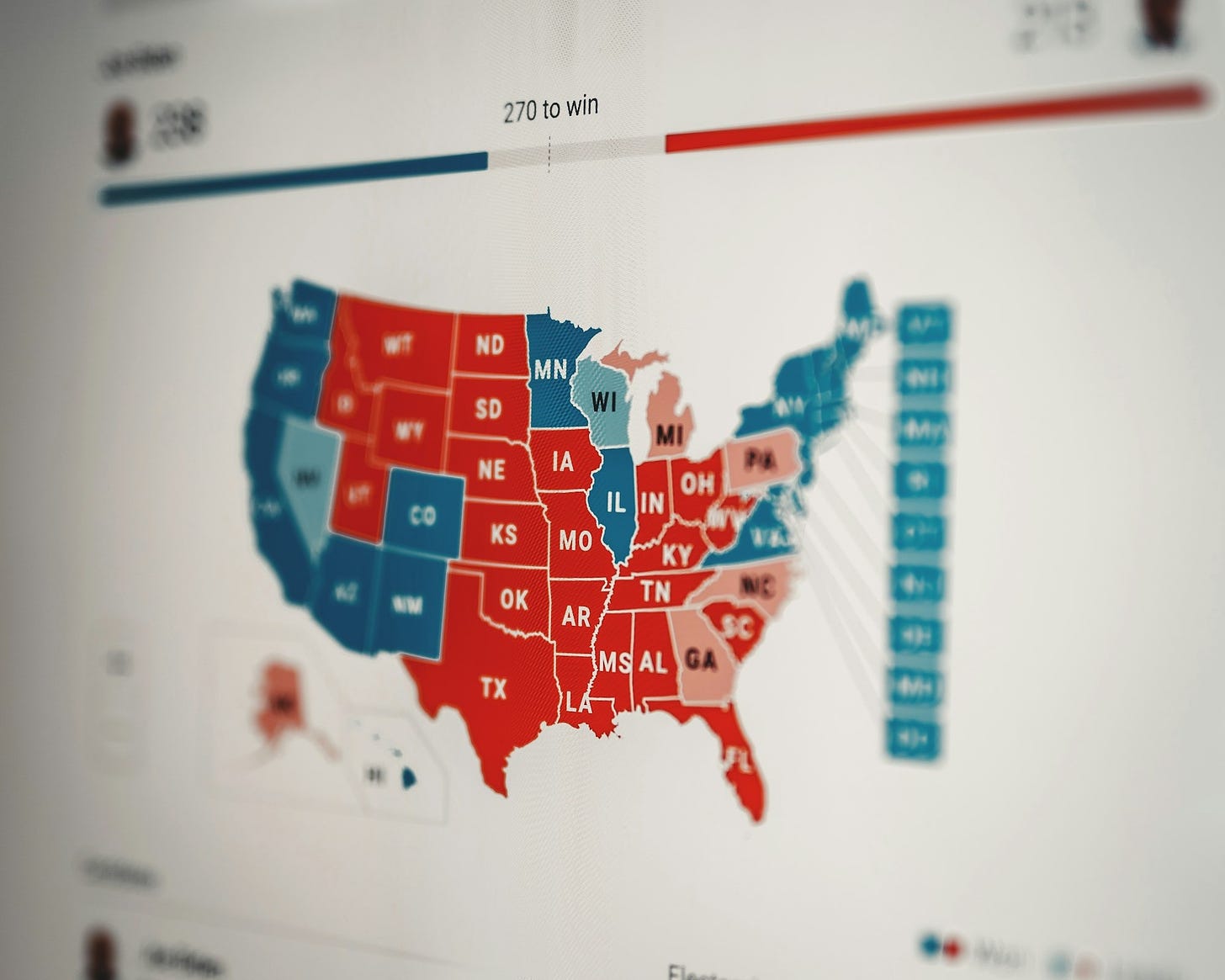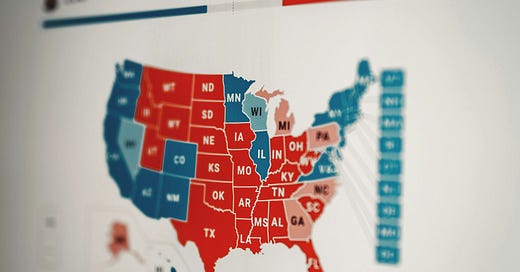Legalized election betting
Should election betting be legal in the US? Viewpoints from multiple sides.

Enjoying Framechange? Forward to a friend to help spread the word!
New to Framechange? Sign up for free to see multiple sides in your inbox.
Learn more about our mission to reduce polarization and how we represent different viewpoints here.
Snippets
Israel said it killed one of Hezbollah’s top commanders, Ibrahim Aqil, in airstrikes on Beirut, Lebanon. The assault comes after a series of strikes in southern Lebanon and two days of surprise attacks involving exploding pagers and radios used by Hezbollah members that killed a reported 37 people and wounded roughly 3,000.
Constellation Energy plans to reopen the nuclear power plant on Three Mile Island in 2028, subject to approval by the Nuclear Regulatory Commission. Microsoft will purchase power from the plant to power its data centers in a 20-year deal.
The US Federal Reserve cut interest rates by 50 basis points, lowering the federal funds rate to a range of 4.75%-5%. Interest rates had been at 5.25%-5.5% since July 2023 (their highest level since 2001). The reduction comes amid signs of easing inflation.
Instagram said it is restricting teen accounts in an effort to ramp up protections and respond to parent feedback. Restrictions starting this week include automatically making teen accounts private, limiting adult-oriented content shown to teens, and blocking workarounds for teens to lie about their age.
The Senate struck down a proposed bill that would protect in vitro fertilization at the national level, with voting largely along party lines. Republican Senators Susan Collins (R-Maine) and Lisa Murkowski (R-Alaska) were the lone Republican votes in favor of the bill.
What’s happening
Last week, a federal judge ruled that online prediction marketplace Kalshi could list derivatives contracts enabling Americans to bet on political elections. Hours later, the DC Circuit Court of Appeals paused the betting on appeal by the Commodity Futures Trading Commission (CFTC), the regulatory body responsible for policing derivatives markets in the US. (The appeals court began hearing oral arguments yesterday, with election betting paused in the meantime.)
Why it’s important: If Kalshi is ultimately allowed to list its elections derivatives, it would be the first time election betting at scale is legally sanctioned in the US in roughly a century. Kalshi’s initial contracts would let Americans place bets on whether Republicans or Democrats will win control of the House or Senate in November, with permitted trade sizes as high as $100M.
In the brief 8-hour window in which election bets were sanctioned on Kalshi, 50,000+ contracts were traded.
Role of the CFTC: The CFTC, a small federal agency established in 1974 traditionally rooted in regulating agricultural commodities, rejected Kalshi’s initial application to offer elections derivatives in 2023. Kalshi filed a federal lawsuit in response, leading to the current stalemate.
Going mainstream: On the heels of last week’s initial ruling, reports surfaced that popular trading platform Interactive Brokers would launch a market enabling investors to bet on the outcome of the US presidential election. As a larger trading platform with 3M+ customer accounts, Interactive Brokers would likely drive US election betting further into the mainstream should the appeals court rule in favor of Kalshi.
Existing alternatives: While political-betting markets aren’t sanctioned at scale in the US, there are several alternatives to more formal derivatives exchanges. Polymarket is a crypto-based offshore prediction market that enables betting on US political events but is technically off limits to Americans (users in the US have reported using the platform by disguising their locations).
PredictIt is a prediction market operated by New Zealand’s Victoria University for research purposes with strict spending and participation limits (up to $850 per contract and 5,000 betters per market). The University of Iowa is permitted to run a small-scale election market for research in the US, with bets limited to $500 per person. In the UK, political event betting is legal but regulated.
While election betting on US exchanges is currently on pause, its potential legalization has surfaced debate over its merits and drawbacks. This week, we bring you the viewpoints from multiple sides. Let us know what you think.
Notable viewpoints
More supportive of sanctioned election betting:
Election betting markets help businesses hedge risks.
Election betting provides a valuable hedge for businesses to offset the risks of certain election outcomes; for example, an alternative energy company could place a bet on Republicans winning a majority in the Senate – an outcome that might constrain or reverse certain climate policies – to offset potential damages to their business.
Political event trading is a form of “responsible innovation,” which the CFTC was tasked by Congress through the Commodity Exchange Act (1936) (CEA) to promote.
Prediction markets are more accurate than polls.
Political prediction markets are more accurate than public opinion polls because investors have money on the line and an incentive to get things right.
Election betting markets are faster than polls and statistical models, effectively providing real-time information on where races stand in the face of current events.
“[Political prediction markets] have a very good track record of being better than polls and better than political geniuses…They’re a much purer way for people in business, government and interested parties to understand what might happen.” (Jason Furman, former Obama White House economist.)
There is little evidence that prediction markets are easily manipulated.
Political prediction markets are historically not easy to manipulate; a 2008 University of Arizona and University of Kansas working paper found that, among 3 historical examples of attacks on political prediction markets, prices returned to normal after a short period.
Unregulated election markets already exist and require interested parties to use riskier offshore platforms; legalizing election betting would increase participation and make it harder for the betting markets to be manipulated because no single bet or group of bets could have an outsized impact.
The CFTC’s case against Kalshi is not legally sound.
The CFTC can only limit contracts where the underlying activity is illegal (e.g., terrorism) and election outcomes are not an illegal activity.
While the CFTC has the authority under the Dodd-Frank Act (2010) to limit contracts that involve “gaming,” election betting does not constitute “gaming” because the underlying event is a real election, not a game; therefore previous rulings by the CFTC to outlaw election betting have been based on incorrect readings of the law – a conclusion supported even by former CFTC regulators now associated with Kalshi.
More opposed to sanctioned election betting:
Election betting would undermine the integrity of elections.
Election betting could mix political preferences with financial incentives among voters and distort voting activity, harming the integrity of elections.
“Allowing billionaires to wager extraordinary bets while simultaneously contributing to a specific candidate or party, and political insiders to bet on elections using non-public information, will further degrade public trust in the electoral process.” (Democratic Senators in a letter to CFTC.)
In the UK, where political event betting is legal but regulated, several political figures are being investigated by the UK’s Gambling Commission for allegedly betting on the timing of the prime minister’s call for a snap election based on inside information.
Election betting would encourage market manipulation.
Election betting could encourage market manipulation; traders on Polymarket last week reportedly attempted to artificially increase the odds that Vice President Kamala Harris would win the election by betting heavily on that outcome in order to win a separate bet.
Examples of manipulation have occurred on at least two unsanctioned election betting platforms similar to Kalshi; for example, a 2017 fake poll showing singer Kid Rock led Michigan Senator Debbie Stabenow in a Michigan Senate race influenced the price of elections contracts. (The singer ultimately did not run.)
Sanctioned election betting would put significant pressure on regulatory agencies.
Permitting election betting would put undue strain on regulators, particularly in contested elections; for example, uncertified and smaller elections would require the CFTC to take on the additional role of election enforcer, which it is not equipped or resourced to handle.
There is limited evidence prediction markets are more accurate than public opinion polls.
There is no consistent evidence that prediction markets are better at predicting election outcomes than traditional forecasting models; a 2022 Barnard College study based on 2020 and 2022 congressional election results explored the discrepancies between the predictive performance of forecasting models (e.g., from FiveThirtyEight) and prediction markets (e.g., PredictIt), noting significant challenges in accurately comparing their performance.
The federal judge’s ruling in favor of Kalshi is not legally sound.
The CFTC has statutory authority to restrict event contracts that are contrary to the public interest, and election betting is against the public interest; the federal judge’s conclusion that the CFTC can only limit contracts where the underlying activity is illegal (e.g., terrorism) is an overly narrow interpretation of the law.
The CFTC has authority to limit “gaming” contracts, and a reasonable definition of “gaming” is “gambling;” staking something of value on political election outcomes is akin to gambling and therefore the CFTC should be allowed to restrict it.
From the source
Read more from select primary sources:
Full text of Commodity Exchange Act (1936)
Full text of Dodd-Frank Act (2010)
Archive of filings in KalshiEX LLC v. CFTC
Be heard!
We want to hear from you! Comment below with your perspective on election betting and we may feature it in our socials or future newsletters. Topic ideas to consider:
Do you think election betting on derivatives markets should be legalized in the US?
What are some arguments or supporting points you appreciate about a viewpoint you disagree with?
Give us your feedback! Please let us know how we can improve.
Music on the bottom
Don’t sleep on this all-time classic from The Doors, “Touch Me.” (School of Rock fans have a special place in their hearts.)
Listen on Spotify, Apple Music, or Amazon Music.




